|
|
|
Sort Order |
|
|
|
Items / Page
|
|
|
|
|
|
|
| Srl | Item |
| 1 |
ID:
147308
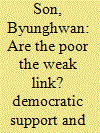

|
|
|
|
|
| Summary/Abstract |
Extant literature on democratization documents that ordinary citizens’ unconditional support for democracy is indispensable to democratic consolidation. Yet observers of nascent democracies have repeatedly witnessed that such support often hinges upon their economic conditions. This article argues that income levels have a conditioning effect on this relationship; the Korean poor see democracy as a tool for income redistribution and are less likely than the rich to support it when economic hardships appear to close windows of opportunities for such redistribution. Using survey data from the first round of the Asian Barometer Survey on South Korea, I find strong empirical support for this argument. The implication of this finding for broader literature on democratization is that the weakening of young democracies can be attributed to the poor in times of trouble, or the “weak link.”
|
|
|
|
|
|
|
|
|
|
|
|
|
|
|
|
| 2 |
ID:
115615
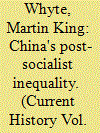

|
|
|
|
|
| Publication |
2012.
|
| Summary/Abstract |
The country's sharp increase in income inequality is not the result of the rich getting richer while the poor become poorer.
|
|
|
|
|
|
|
|
|
|
|
|
|
|
|
|
| 3 |
ID:
161870
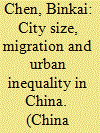

|
|
|
|
|
| Summary/Abstract |
This paper examines the relationship between city size, migration, and urban income inequality using a subsample of the 1% population census of China in 2005. We calculate various measures of within-city income inequality for 252 Chinese cities. It is found that overall city income inequality is significantly and positively correlated with population size. As migration is crucial in determining city size distribution in China, we focus on exploring the role of massive migration into big cities in shaping this size-inequality relationship. We find that the share of migrants alone accounts for more than 40% of the city size inequality premium. This is primarily because migration leads to higher skill premiums in larger cities by changing the skill composition of workers in those places.
|
|
|
|
|
|
|
|
|
|
|
|
|
|
|
|
| 4 |
ID:
146103


|
|
|
|
|
| Summary/Abstract |
The mass franchise led to more responsive government and a more equitable distribution of resources in the United States and other democracies. Recently in America, however, voter participation has been low and increasingly biased toward the wealthy. We investigate whether this electoral “class bias” shapes government ideology, the substance of economic policy, and distributional outcomes, thereby shedding light on both the old question of whether who votes matters and the newer question of how politics has contributed to growing income inequality. Because both lower and upper income groups try to use their resources to mobilize their supporters and demobilize their opponents, we argue that variation in class bias in turnout is a good indicator of the balance of power between upper and lower income groups. And because lower income voters favor more liberal governments and economic policies we expect that less class bias will be associated with these outcomes and a more equal income distribution. Our analysis of data from the U.S. states confirms that class bias matters for these outcomes.
|
|
|
|
|
|
|
|
|
|
|
|
|
|
|
|
| 5 |
ID:
147497
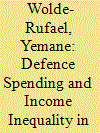

|
|
|
|
|
| Summary/Abstract |
The rising trend in income inequality has recently attracted a renewed interest in the determinants of this growing trend across many countries. This article adds to the debate by investigating the impact of defence expenditure as a possible determinant of inequality in Taiwan, a country once was considered to be a poster child of an equitable growth, but now income inequality has become one of the Taiwan’s growing challenges. Applying the bounds test approach to cointegration and four long-run estimators for the period from 1976–2011, we found a long-run relationship between the various measures of inequality and defence expenditure where defence expenditure exerts a positive and a statistically significant impact on the worse income inequality in Taiwan. Further application of the lag-augmented causality test procedure also reveals a unidirectional causality running from defence expenditure to income inequality with defence expenditure causing income inequality to rise.
|
|
|
|
|
|
|
|
|
|
|
|
|
|
|
|
| 6 |
ID:
137933
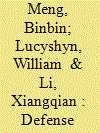

|
|
|
|
|
| Summary/Abstract |
There are conflicting views as to the relationship between a nation’s defense expenditure (DE) and its population’s income inequality (INEQ). DE, always an important part of government budget, can easily crowd out transfer payments, necessary to improve INEQ; however, these payments may also create a demand that may raise the income levels of the lower income earners. Consequently, the relationship between DE and INEQ is an important question. This paper examines the relationship between DE and INEQ in China for the period of 1989–2012. Utilizing basic cointegration and causality tests, our objective is to add to the literature by providing evidence that China’s DE, in fact, do have an impact on INEQ.
|
|
|
|
|
|
|
|
|
|
|
|
|
|
|
|
| 7 |
ID:
099895
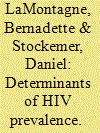

|
|
|
|
|
| Publication |
2010.
|
| Summary/Abstract |
Slightly over 25 years since the identification of the virus, Human Immunodeficiency Virus/Acquired Immune Deficiency Syndrome (HIV/AIDS) epidemic has killed millions of people and has expanded to become one of the greatest dangers in the world, threatening individuals, economies, communities and states. To better understand the factors underlying the wide discrepancies in HIV rates across countries, and to better prioritize interventions in the global fight against HIV/AIDS, it is imperative to build sound models that help to identify determinants of worldwide HIV prevalence. While scholars of various disciplines such as political science, anthropology and health studies have engaged in this endeavor, these studies have found divergent results. Seeking to construct a viable model, this current study examines nine theory-informed variables - income inequality, regime type, gender equality, GDP per capita (PPP), control of corruption, per cent Muslims in a country, education, contraceptive use and availability of antiretroviral medication that potentially affect a state's HIV prevalence. This research finds that conditions favorable to a decrease in HIV are low income inequality, a high per cent of Muslims in a country's population and high contraceptive use.
|
|
|
|
|
|
|
|
|
|
|
|
|
|
|
|
| 8 |
ID:
155845
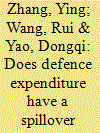

|
|
|
|
|
| Summary/Abstract |
China’s defence expenditure has been growing rapidly along with GDP growth during the past two decades. Meanwhile, the income gap has continued to increase. There are conflicting views regarding whether the defence expenditure is capable of reducing income inequality. Therefore, this paper investigates the existence of any spillover effect of defence expenditure on income inequality, with a special focus on the regional differences among 31 provinces and 7 military regions in China. We extend panel cointegration and the impulse response function by using panel data during the period of 1997–2012. The empirical results show that the defence expenditure has an impact on income inequality, and the effect varies over different regions in China. The defence expenditure has a spillover effect on income inequality in the full sample panel and the southeastern panel. An increase in the defence expenditure does not crowd out social welfare spending due to the high level of economic development and government expenditure. On the contrary, in the northern panel, the effect is opposite because of the unbalanced economic development levels within the panel. Beijing as the capital of China, benefits more from the expansion of defence expenditure thus widening the income gap. In addition, the impulse response analyses further confirm a stronger effect of the defence expenditure on income inequality in the northern and the southeastern panels over a short period.
|
|
|
|
|
|
|
|
|
|
|
|
|
|
|
|
| 9 |
ID:
182528
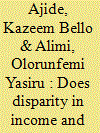

|
|
|
|
|
| Summary/Abstract |
Does disparity in income and consumption incite terrorism in Africa? To answer this important question, we investigate the empirical linkages between inequality and terrorism by separately regressing income and consumption inequalities on four indicators of terrorism: domestic, transnational, unclear, and total over the period 1980–2012. Employing a negative binomial regression across a panel dataset covering 46 African economies, the following findings are established. First, both income and consumption inequalities have decreasing impacts on all terrorism measures—with the exception of uncertain terrorism (the impact of which is negligible). Second, both income and consumption inequalities exert more statistical influence on transnational terrorism than domestic terrorism. Third, income inequality exerts more statistical weight on terrorism measures than consumption inequality across the model specifications. Last, the non-trivial impact of confounding variables—such as the lagged value of terrorism, surface areas, and conflicts—are validated across the terrorism models. In line with these empirical outcomes, policy implications and suggestions for further studies are offered.
|
|
|
|
|
|
|
|
|
|
|
|
|
|
|
|
| 10 |
ID:
129831
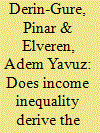

|
|
|
|
|
| Publication |
2014.
|
| Summary/Abstract |
Separatist terrorism has been a severe problem for Turkey since the mid-1980s. The conventional wisdom contends that economic deprivation in southeastern Turkey is the fundamental reason for the long-running battle against the Kurdish rebels. Considering that there is limited empirical literature on the roots of terrorism in Turkey, yielding conflicting results about the claim that the main cause of terrorism is deprived economic conditions, this study aims to answer whether there is a causal relationship between income inequality and separatist terrorism in Turkey. To this end, the Global Terrorism Data Base for the period of 1973-2006, two Theil indices of pay inequality as proxy for income inequality, and the vector autoregression and Autoregressive Moving Average (ARMA) methods are utilized. The results support the early findings that income inequality, a particular focus in this paper and an essential indicator of economic deprivation, is not a main cause of escalation of separatist terrorism in Turkey.
|
|
|
|
|
|
|
|
|
|
|
|
|
|
|
|
| 11 |
ID:
188454
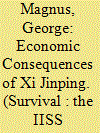

|
|
|
|
|
| Summary/Abstract |
In the aftermath of the 20th National Congress of the Chinese Communist Party, Xi Jinping’s principal focus will be on state and national security, while an entirely new economic- and financial-policy team, with little experience, will take charge of China’s troubled economy. Its members will have to manage several systemic problems – a debt mountain, a property bust, a rapidly ageing population, zero-COVID policies – and develop a viable new economic-development model. This would be a demanding agenda anywhere, but Xi’s China has to tackle it guided by an ever more devoutly Leninist approach to economic management, industrial policy and governance, at a time when China faces the most hostile external environment it has known since Mao Zedong, as exemplified by foreign decoupling. Although Xi’s China is capable of important accomplishments in science and technology, and of flexing its diplomatic and military muscles in defence of its interests, China’s politics may be much less capable of fixing the country’s systemic economic and financial weaknesses. The consequences of Xi Jinping’s economic programme, including an emphasis on self-reliance, promise to extend beyond China’s borders to foreign actors and countries that once benefited from its economic rise.
|
|
|
|
|
|
|
|
|
|
|
|
|
|
|
|
| 12 |
ID:
096687
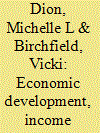

|
|
|
|
|
| Publication |
2010.
|
| Summary/Abstract |
Adopting a cross-regional and global perspective, this article critically evaluates one of the core assertions of political economy approaches to welfare-that support for redistribution is inversely related to income. We hypothesize that economic self-interest gives way to more uniform support for redistribution in the interest of ensuring that basic or relative needs are met in less developed and highly unequal societies. To test this hypothesis, we analyze individual-level surveys combined with country-level indicators for more than 50 countries between 1984 and 2004. Our analysis shows that individual-level income does not systematically explain support for redistribution in countries with low levels of economic development or high levels of income inequality. These findings challenge the universality of the assumption of economic self-interest in shaping preferences for redistribution that has been so pervasive in the literature.
|
|
|
|
|
|
|
|
|
|
|
|
|
|
|
|
| 13 |
ID:
168342
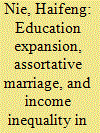

|
|
|
|
|
| Summary/Abstract |
In this paper, we study the pattern of assortative marriage in China since 1990 and its impact on income inequality. The results indicate that men in China are increasingly likely to marry women of similar education levels. We calculate the counterfactual income inequality that would prevail if marriages were randomly matched in terms of education. In 2005, China's overall Gini coefficient of household income per capita would decline from 0.512 to 0.476 if marriages were randomly matched. In urban areas, assortative marriage in education increased the Gini coefficients from 0.321 to 0.338 in 2009. The decomposition exercise shows that the rising returns to education contribute most to the increase in income inequality in urban areas between 1990 and 2009, while the change in marriage assortativeness plays a minor role.
|
|
|
|
|
|
|
|
|
|
|
|
|
|
|
|
| 14 |
ID:
188153


|
|
|
|
|
| Summary/Abstract |
This study examines the impacts of public transfers on income inequality and poverty reduction in rural China. It uses nationally representative rural household surveys from the China Household Income Project and classifies public transfers into three types – universal, pro-poor, and reimbursable transfers – to compare the impacts of each type of public transfer in 2013 and 2018. Estimated results show that the contributions of each type of public transfer to reducing income inequality were generally small in both 2013 and 2018. However, the effects of reimbursable transfers were the largest of the three types. We also found that the poverty-reducing effects were the largest for reimbursable transfers, and their impacts have considerably improved in the western region. The impacts of pro-poor transfers were intermediate but have developed notably in the central region. These findings suggest that reimbursable and pro-poor transfers contributed mainly to reducing rural poverty but the impacts were heterogeneous among regions.
|
|
|
|
|
|
|
|
|
|
|
|
|
|
|
|
| 15 |
ID:
118281
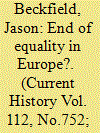

|
|
|
|
|
| Publication |
2013.
|
| Summary/Abstract |
"[T]he level of income inequality within European nations has been increasing since neoliberalism took hold in the EU in the 1980s and 1990s.
|
|
|
|
|
|
|
|
|
|
|
|
|
|
|
|
| 16 |
ID:
147546
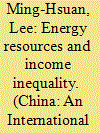

|
|
|
|
|
| Summary/Abstract |
Previous studies have investigated the factors underlying China’s income inequality. However, an important factor—the influence of natural resources—has been overlooked. To reinforce understanding of the factors contributing to income inequality in China, this study examines the role of energy resources in income inequality. This study established a 2005–10 provincial panel data set and adopted a dynamic panel data model with system GMM (generalised method of moments) estimators as empirical strategies. The results demonstrate that provinces that are more dependent on energy resources exhibit higher levels of income inequality and the findings are robust under different measures of income inequality.
|
|
|
|
|
|
|
|
|
|
|
|
|
|
|
|
| 17 |
ID:
164720
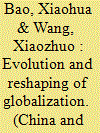

|
|
|
|
|
| Summary/Abstract |
With the weakening role of the World Trade Organization multilateral trading system, the globalization pattern is moving toward regional economic integration. As a result, the number of regional trade agreements (RTAs) has rapidly increased. New trends in international economics and trade, such as the withdrawal of the US from the Trans‐Pacific Partnership and the trade disputes between the US and China, have revealed the intention of the developed countries represented by the US to reshape the direction of globalization. This paper combines the relevant research conclusions and current stylized facts to examine the evolution and reshaping of globalization. We find that: (i) countries have different attitudes toward the recent round of globalization, which are related to changes in the patterns of income distribution within countries caused by the last round of globalization; and (ii) regional economic development is an effective way to reshape globalization. The self‐strengthening effect of the hub country in the trade network has promoted global RTA expansion.
|
|
|
|
|
|
|
|
|
|
|
|
|
|
|
|
| 18 |
ID:
167621
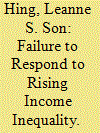

|
|
|
|
|
| Summary/Abstract |
Why is there not more public outcry in the face of rising income inequality? Although public choice models predict that rising inequality will spur public demand for redistribution, evidence often fails to support this view. We explain this lack of outcry by considering social-psychological processes contextualized within the spatial, institutional, and political context that combine to dampen dissent. We contend that rising inequality can activate the very psychological processes that stifle outcry, causing people to be blind to the true extent of inequality, to legitimize rising disparities, and to reject redistribution as an effective solution. As a result, these psychological processes reproduce and exacerbate inequality and legitimize the institutions that produce it. Finally, we explore ways to disrupt the processes perpetuating this cycle.
|
|
|
|
|
|
|
|
|
|
|
|
|
|
|
|
| 19 |
ID:
126936
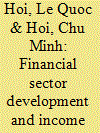

|
|
|
| 20 |
ID:
111774
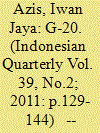

|
|
|
|
|
|
|
|